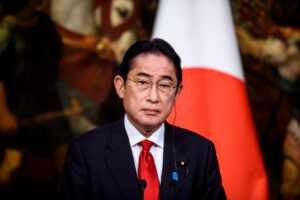The new Labour government appears to be as relaxed about developing a “nanny state” reputation as it is about being seen as a purveyor of economic doom and gloom. From October next year, television adverts for junk food will not be permitted before the 9pm watershed and online adverts will be banned entirely. Measures are on the way to stop children from buying high-caffeine drinks and to ban anyone born after January 2009 from buying cigarettes. Meanwhile, the NHS is poised to enter workplaces to check our weight, blood pressure and cholesterol. All this is part of a drive towards preventive medicine in the UK: a country where obesity alone — affecting more than a quarter of the population — is said to cost the NHS upwards of £6 billion per year. Compare this with Japan, where less than 5% of the population is obese.
Is there anything Sir Keir could learn from the Japanese? They certainly have a better diet. For one thing, it is easy to get hold of a wide range of fresh fish, whereas in UK supermarkets much of our fish is either frozen, breadcrumbed or gives off that tell-tale fishy smell that means it’s already going bad. Add to that tofu, fresh and pickled veg, miso soup and nattō — sticky fermented soybeans — and you have the basis of a very wholesome diet. What’s more, in Japanese cuisine there is an emphasis on high-quality ingredients, simply prepared, with comparatively little in the way of complex sauces liable to introduce large amounts of fat, sugar or salt into a meal. Japanese children learn about nutrition in depth at school, and lunches there are prepared with strict nutritional guidelines in mind. Youngsters are also taught to stop eating when they feel 80% full, on the basis that by that point they have eaten all they need and the brain just needs a little time to register the fact.
Still, there is more to the story than diet and nutrition. Successive governments stretching back to the late 19th century have had a hand in crafting Japanese attitudes towards physical health — and not always out of straightforward concern for people’s wellbeing. Some of modern Japan’s earliest nutritionists worked for the armed forces, trying to build the bodies of their soldiers in the 1860s and 1870s. One of the reasons why Japan dropped its Buddhist prohibition on meat-eating — ushering in a first generation of “stew-restaurants” — was the hope that beef-eating in particular would help soldiers to heal faster from their injuries. Everyone from the Emperor downwards soon began eating beef for its promised health benefits.
Nineteenth-century doctors in Japan took a great interest, too, in the health of pregnant women. Healthy women and healthy babies were thought to be essential to the building of a robust workforce. Much was made of how workers in Western countries were often taller and stronger, placing Japan at a competitive disadvantage in everything from industry to future combat. In short, the thought emerged very early in the life of modern Japan that a person’s health is a public good.
This was part of a bigger picture in which the job of the state was not so much to fulfil the wishes of the population as to manage it according to what a small ruling elite regarded as being in the country’s best interests. Japan’s civil servants regarded themselves as “shepherds of the people”: they would research the sorts of Western social problems to which a modernising Japan was liable to fall victim, come up with solutions and then implement them with the help of doctors, midwives and school teachers. Compared to countries such as the UK, mass party politics and the idea of bottom-up political change never really took hold in pre-war Japan. People were taught that the state, as the expression of the Emperor’s will (in reality, the will of a tiny ruling clique), knew best. This idea survived into the postwar period, when after a brief flirtation with Left-wing politics an “iron triangle” of Right-leaning politicians, businesses and the civil service helped to manage the country’s remarkable economic recovery.
The result of all this has been that people in Japan accept a degree of paternalism and official cajolery from their leaders that would feel culturally alien in the UK. Public trust is sometimes undermined, when politicians are revealed to be on the take or when the state response to disasters — notably the earthquake, tsunami and nuclear meltdown of March 2011 — is exposed as inadequate. But the Japanese state has proven resilient over the years, notably in responding to public disquiet about environmental pollution in the Sixties and Seventies by advising big businesses to salvage their reputations and protect themselves against legal action by agreeing to stringent environmental and health and safety legislation. This included workplace health checks like the ones that Labour are considering for the UK: these have been happening in Japan for more than 50 years.
The trend, over time, has been towards expanding the scope of these checks. What started, in 1972, as a basic physical exam alongside blood and urine tests steadily expanded to include tests for cholesterol and blood sugar levels and even electrocardiograms. Employers are under a legal obligation to follow up with their employees, meaning that your boss may insist on you taking measures to lose weight. For the past decade, psychological stress has been tested too, partly in response to high-profile lawsuits launched by families of workers who died from overwork, including by suicide.
It may be that in the UK, too, once people have accepted the idea of health checks in the workplace then the scope of those checks will steadily grow. Whether or not we will become comfortable with our employers taking a close interest in our health, however, remains to be seen. During the mindfulness boom of the 2010s, suspicions were raised that companies encouraging their employees to meditate might have their eye more on improving workers’ productivity than their wellbeing. Besides, in Japan it has long been accepted — if not necessarily welcomed by all — that employers and even complete strangers may comment on your physical health. It was part of a culture of corporate paternalism that saw employers regularly attending their employees’ weddings and even giving speeches at them. At the same time, what might be considered fat-shaming or plain old rudeness in the UK happens quite frequently in Japan: people report having comments made about their size in public, even receiving gentle prods in the stomach as someone marvels at their excess flesh.
Some say that we can’t tackle obesity, Japan-style, because we would first need to reimagine our society, accepting a deeper level of involvement by the state, our employers and even complete strangers in our physical health. But perhaps that puts things the wrong way around. It may be instead that by adopting measures of the kind that Labour is proposing, the idea takes root that physical health is a communal rather than just a personal good, not least because it eases pressure on the NHS. Obesity is less obviously harmful to others in the way that smoking and drink-driving are: two practices that were reversed in part by establishing them as socially taboo. But it is not impossible to imagine the case being successfully made.
Critics of Japanese conformity might say that this isn’t the sort of society we want to become; that “community” is all very nice until you bump up against ideas that you find unacceptable, but which other people seek to impose on you. And yet for those who think that post-Covid Britain is losing its sense of community and basic interpersonal trust, workplace health checks — conducted with compassion and with real interest in people’s lives and wellbeing — might, in time, become part of our road to recovery.
Disclaimer
Some of the posts we share are controversial and we do not necessarily agree with them in the whole extend. Sometimes we agree with the content or part of it but we do not agree with the narration or language. Nevertheless we find them somehow interesting, valuable and/or informative or we share them, because we strongly believe in freedom of speech, free press and journalism. We strongly encourage you to have a critical approach to all the content, do your own research and analysis to build your own opinion.
We would be glad to have your feedback.
Source: UnHerd Read the original article here: https://unherd.com/



